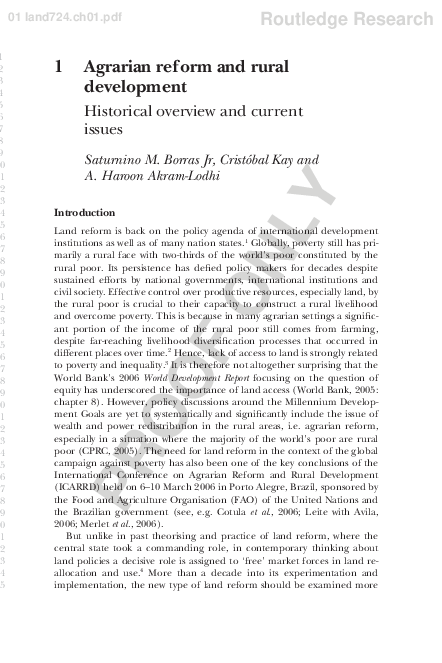Assessing Reform UK's Credibility On Agricultural Issues

Table of Contents
Reform UK's Stated Agricultural Policies
Reform UK's stated agricultural policies represent a significant departure from the current agricultural landscape in the UK. They advocate for a radical shift away from the current system, which heavily relies on subsidies and EU-aligned regulations. While specifics are still developing, their public statements reveal key tenets of their agricultural platform.
-
Specific policy proposals regarding direct payments to farmers: Reform UK has generally expressed skepticism towards the current system of direct payments, suggesting a move towards a more market-driven approach. Details on the specifics of replacement mechanisms remain limited, leading to uncertainty amongst farmers.
-
Stance on EU agricultural regulations and potential replacements: Reform UK advocates for a complete overhaul of existing regulations, viewing many as overly bureaucratic and detrimental to farming efficiency. They propose replacing these with a streamlined, UK-specific regulatory framework. The exact nature of this framework is yet to be fully detailed.
-
Proposed approach to environmental land management schemes (ELMs): Reform UK's stance on ELMs is unclear. While acknowledging the importance of environmental stewardship, they haven't fully articulated their plans for replacing or modifying the existing ELM schemes. This lack of clarity raises concerns among environmental groups.
-
Views on food security and import/export policies: Reform UK champions a policy of food security, emphasizing the need to support domestic food production. Their proposed approach to trade deals and import/export regulations is geared towards protecting British farmers from unfair competition. However, the balance between protecting domestic farmers and ensuring competitive food prices needs further clarification.
-
Details on any published manifestos or policy documents: At present, Reform UK's agricultural policies are primarily disseminated through press releases and statements by party representatives. A comprehensive policy document dedicated solely to agriculture is yet to be released.
Analysis of Reform UK's Agricultural Proposals
A critical evaluation of Reform UK's agricultural proposals requires careful consideration of their feasibility and potential impact across various sectors.
-
Economic analysis of proposed subsidy reforms: The proposed shift away from direct payments raises serious concerns about the economic viability of many farms, particularly smaller and less efficient operations. A detailed cost-benefit analysis is needed to evaluate the impact on farm incomes and overall agricultural productivity.
-
Environmental impact assessment of proposed changes to ELMs: The lack of clarity surrounding Reform UK's approach to ELMs hinders any robust environmental impact assessment. The potential effects on biodiversity, carbon emissions, and water quality remain largely unknown.
-
Assessment of the alignment with international trade agreements and WTO rules: Reform UK's emphasis on protecting British farmers might clash with existing international trade obligations and WTO rules. A thorough analysis is needed to identify potential conflicts and the associated economic and political ramifications.
-
Analysis of the potential social impact on rural communities: The potential for job losses and economic hardship in rural communities due to policy changes warrants careful consideration. The social impact of Reform UK's proposals requires thorough investigation.
-
Comparison with existing agricultural policies from other parties: Compared to other major parties, Reform UK's agricultural policy appears more radical and less detailed. The lack of concrete proposals makes it difficult to assess its long-term implications effectively.
Comparison with Existing Agricultural Policy
Reform UK's proposed agricultural policies differ significantly from the existing agricultural policy framework in the UK, as well as the proposals of other major parties. The current system, heavily influenced by EU regulations and direct payments, offers a stark contrast to Reform UK's vision of a more market-driven and less regulated sector. Other parties generally propose modifications to the existing system rather than the wholesale overhaul advocated by Reform UK. This divergence presents potential for both significant disruption and potential for unexpected benefits, depending on the successful implementation of policy changes. The level of continuity or disruption will largely depend on the details of their yet-to-be fully-defined plans.
Expert Opinions and Public Reaction to Reform UK's Agricultural Stance
Gathering expert opinions and gauging public reaction to Reform UK's agricultural stance is crucial for a comprehensive assessment. Currently, there's a limited body of publicly available analysis from agricultural economists and environmental scientists specifically addressing Reform UK's proposals.
-
Quotes from relevant experts supporting or criticizing Reform UK's policies: More research is needed to collect expert opinions. Initial indications suggest a degree of skepticism towards the party’s proposals due to the lack of detail and potential negative consequences for farmers and the environment.
-
Summary of media coverage and public reaction to Reform UK's agricultural plans: Media coverage has been relatively limited, likely due to the absence of a fully formed and detailed policy document. Public reaction remains largely unknown pending further clarification of their proposals.
-
Analysis of any polls or surveys assessing public opinion on these policies: Comprehensive public opinion polling on Reform UK's agricultural policies is currently unavailable. Future research will be needed to gauge public support for their proposals.
Conclusion
This article has assessed Reform UK's credibility on agricultural issues. The party's proposals represent a significant departure from existing policies, advocating for a radical shift towards a more market-driven approach. While promising greater efficiency and reduced bureaucracy, the lack of detail and potential negative consequences for farmers and the environment raise concerns. Further research into Reform UK agricultural policy, including a detailed cost-benefit analysis and environmental impact assessment, is crucial. The limited expert opinion and public reaction highlight the need for greater transparency and engagement with the agricultural sector. Understanding the different approaches to farming policy, including a thorough understanding of Reform UK agricultural policy, will allow voters to make informed choices in upcoming elections.

Featured Posts
-
 Christina Aguileras Transformation Is She Defying Time
May 03, 2025
Christina Aguileras Transformation Is She Defying Time
May 03, 2025 -
 More School Desegregation Orders Expected To Follow Legal Analysis
May 03, 2025
More School Desegregation Orders Expected To Follow Legal Analysis
May 03, 2025 -
 1 Mayis Emek Ve Dayanisma Guenue Emekcilerin Muecadelesi Ve Arbedeler
May 03, 2025
1 Mayis Emek Ve Dayanisma Guenue Emekcilerin Muecadelesi Ve Arbedeler
May 03, 2025 -
 Investing In Belgian Energy Storage A Case Study Of A 270 M Wh Bess Project
May 03, 2025
Investing In Belgian Energy Storage A Case Study Of A 270 M Wh Bess Project
May 03, 2025 -
 V Mware Costs To Skyrocket At And T Details 1050 Price Increase From Broadcom
May 03, 2025
V Mware Costs To Skyrocket At And T Details 1050 Price Increase From Broadcom
May 03, 2025
Latest Posts
-
 Missouri Hockey History Clayton Keller Hits 500 Nhl Points
May 03, 2025
Missouri Hockey History Clayton Keller Hits 500 Nhl Points
May 03, 2025 -
 Fortnite Maintenance Update 34 40 Server Status And Expected Return
May 03, 2025
Fortnite Maintenance Update 34 40 Server Status And Expected Return
May 03, 2025 -
 Sabrina Carpenter In Fortnite Release Date And Time
May 03, 2025
Sabrina Carpenter In Fortnite Release Date And Time
May 03, 2025 -
 Fortnite Offline Update 34 40 Brings Planned Server Maintenance
May 03, 2025
Fortnite Offline Update 34 40 Brings Planned Server Maintenance
May 03, 2025 -
 Sabrina Carpenter Fortnite Appearance Date And Time Confirmed
May 03, 2025
Sabrina Carpenter Fortnite Appearance Date And Time Confirmed
May 03, 2025
